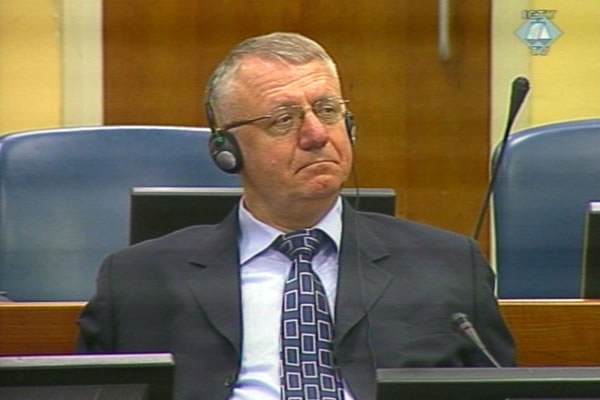Home
SESELJ MAY REAP REWARDS OF PERSISTENCE AGAIN
For the umpteenth time, the Serbian Radical Party leader has filed a motion seeking his ‘urgent and prompt’ release and to be refunded for damages he suffered. It may seem hopeless, but then again, he had kept asking for the disqualification of judges from his Trial Chamber just as many times, and at one point it worked
 Vojislav Seselj in the courtroom
Vojislav Seselj in the courtroom Vojislav Seselj has obviously taken heart after the success of his request for the disqualification of Danish judge Harhoff from the chamber trying him for war crimes against non-Serbs in Croatia, Vojvodina and BH. He has asked yet again for the trial to be suspended and for the Tribunal to give him some money. Specifically, he wants the Tribunal to “suspend the criminal proceedings and urgently release him without further delay“and to pay him 12,000,000 euros (yes, that’s twelve million euros!) as compensation for ‘nonpecuniary damages’.
The trial of the Serbian Radical Party leader has been on hold temporarily following the granting of his motion to disqualify Judge Harhoff from the Trial Chamber because of his alleged bias expressed in a private letter leaked to the media. Senegalese judge Niang has been appointed in his stead, and the full chamber has now invited the parties to present their ideas as to how the trial might go on. In effect, this boils down to how the trial judgment is to be rendered. Initially, it was supposed to be handed down on 30 October, but is now on hold after the disqualification of the Danish judge.
According to Seselj, there is no need to set a new date for the judgment, because his rights have been violated and he has ‘suffered damage’ that can be alleviated only if the trial against him is suspended and if he receives money in compensation. First, he argues that Judge Harhoff has been disqualified from the whole trial, and not just from the deliberations on the judgment. As he claims, this means that ‘every step taken to date in the proceeding’ by the Trial Chamber are ‘null and void’. Seselj also suspects that during the trial, Harhoff ‘nurtured bias’ among his colleagues in the Chamber (presiding judge Antonetti and Judge Lattanzi). As evidence, he notes that after the decision to disqualify Harhoff they both defended him and called for his reinstatement. According to Seselj, this shows there is ‘reasonable doubt’ that they may not be able to make “impartial and just decisions” in the case against him.
The accused considers that Judge Niang cannot take part in the deliberations because he has not attended ‘a single day’ at the trial. As Seselj notes, the Senegalese judge has ‘carelessly’ accepted a job he cannot do, for at least two reasons. First, it is physically impossible for him to familiarize himself with the course of the trial and the evidence in a relatively short time. Second, he cannot properly evaluate the credibility of the witnesses because he was not there while they testified and could not observe the ‘external effects’ of their testimony, i.e., their behavior in court.
For the most part, the motion is devoted to the complaints about violations of Seselj’s right to due process; he reiterates the same arguments he has been trotting out regularly in earlier documents and in court, from the claim that the indictment against him is ‘politically motivated’ and issued at the request of Zoran Djindjic, to the allegations that his right to defend himself have been breached and that the proceedings have been ‘dragged out’ on purpose. He has been in the Tribunal’s detention unit since 24 February 2003, when he voluntarily arrived in The Hague.
This is not the first time that the Serbian Radicals’ leader has asked for an end to his trial and for damages. His demands have all been rejected, but hope as always springs eternal. After all, he had asked many times for various judges to be disqualified from his trial and all the demands had been rejected. His demand for Judge Harhoff’s disqualification, addressed to the ICTY President Theodor Meron, was perfectly timed, and his wish was granted. In his letter, the Danish judge identified Meron as the person responsible for the ‘new course’ which resulted in the release of the warlords of the Balkans.
Linked Reports
- Case : Seselj
- 2013-11-14 NEW DEVELOPMENTS IN SESELJ CASE
- 2013-10-31 SESELJ’S TRIAL CHAMBER FINALLY COMPLETE
- 2013-10-07 MOTION FOR RECONSIDERATION OF DISQUALIFICATION OF JUDGE HARHOFF DENIED
- 2013-12-02 PROSECUTION CALLS FOR SESELJ JUDGMENT IN ‘REASONABLE TIME’
- 2013-12-16 SESELJ JUDGMENT WILL NOT BE DELIVERED BEFORE SECOND HALF OF 2014
- 2014-01-24 PROSECUTION OPPOSES SESELJ'S MOTION TO STAY PROCEEDINGS
